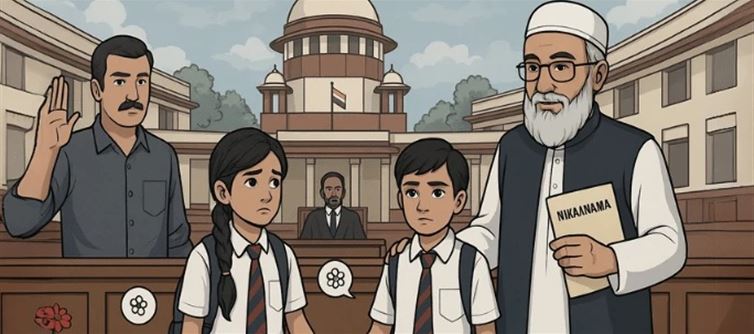
The judiciary may portray this as showing empathy, but Priyank Kanoongo, the former head of the National Commission for Protection of Child Rights, cautioned that it might set off a hazardous chain reaction. He claimed in a post on X that minorities do not even have the right to vote, let alone choose their government. Do we expect children to make intelligent sexual partner choices? Take caution, as this can validate Nikah and other child marriage practices involving young females.
The judicial observation that could be misused
While considering the plea of a lady whose husband received a 20-year sentence under POCSO for having an affair with her when she was 14, the supreme court made the following observations. Senior attorneys Liz Mathew and madhavi Divan were selected as amici curiae by the court, and they suggested a more sympathetic stance toward consensual relationships between adolescents. After that, the court sent a notice to the Center recommending that an expert committee be established to investigate the situation.
Notably, a number of High Courts have already tended toward a more "nuanced" approach, notably those in delhi and Madras. The delhi high court recently ruled that adolescent love should not be punished, dismissing a case against a youngster. However, a few years ago, the madras high court ruled that relationships between adolescents should be seen with empathy rather than through the eyes of an adult.
But this is india, not Scandinavia
The problem here is that the courts may be taking a Western perspective on the matter. In india, something that might serve as a model in liberal Western societies could have disastrous results. Notably, forced child weddings, Nikah involving young girls, widespread trafficking under false pretenses of marriage, and systematic religious conversions under-grooming tactics are just a few of the issues that india is already facing. Decriminalizing adolescent sex might potentially provide a legal loophole for all of these abuses as well as numerous others.
Love is not intended to be policed under the POCSO Act. It is not intended, however, to let adult men to take advantage of legal ambiguities by getting married to or dating minors under the pretense of "adolescent love." It is impossible to overlook how frequently the Nikah route is utilized to evade POCSO fees. Not to mention that the punjab and haryana high court upheld the eligibility of a 16-year-old Muslim woman for Nikah in june 2022, citing Shariah as justification for child marriage. Will traffickers and manipulators who are currently abusing the system be emboldened by this judicial leniency?
The slippery slope ahead
Legal terminology is not the only factor to consider. A socio-cultural landmine, that is. The distinction between love and exploitation will become much more hazy once the law begins to permit "consensual" relationships with 14 or 15-year-olds. Who will confirm the consent? When does a girl from a low-income and marginalized family have the maturity to turn down coercion masquerading as love?
In india, child marriage is a major problem. Thousands, if not lakhs, of child marriages take place in the nation each year. Once the law normalizes adolescent sexual behavior, trafficking rings, khap panchayats, and religious organizations may force vulnerable girls into weddings or other exploitative situations while remaining legally protected.
What is needed - balance, not blanket decriminalization
Indeed, POCSO is occasionally abused, and this needs to be addressed. But rather than being broad, legal reform needs to be selective. Age-gap thresholds, improved counseling techniques, parental mediation, and robust protections must all be included in any adjustment.
The so-called "noble intention of protecting young love" will turn into a catastrophe for society and the protection of young girls if such precautions are not in place. Those with a track record of taking advantage of the weak and voiceless will take control of it.
There is a clear reason why kids are not allowed to vote or drive, regardless of how strongly the court or legislature writes about "empathy." Will we now presume that they are capable of providing sexual consent?
Despite their good intentions, the judiciary is viewed from a Western perspective. Such judgments won't preserve love in a nation like india if they aren't supported by cultural context and caution. They will give abuse legitimacy.




 click and follow Indiaherald WhatsApp channel
click and follow Indiaherald WhatsApp channel